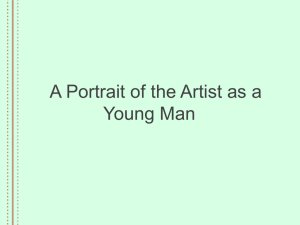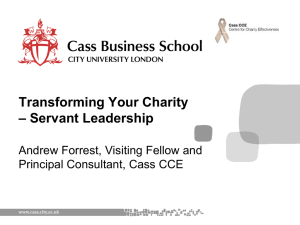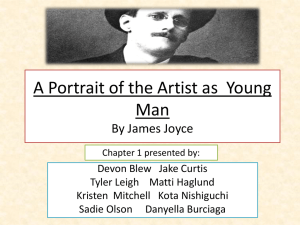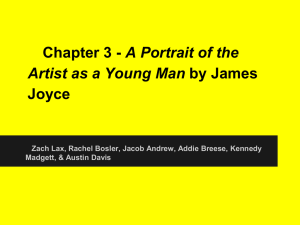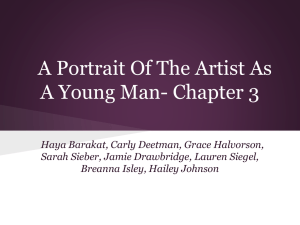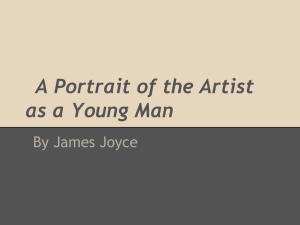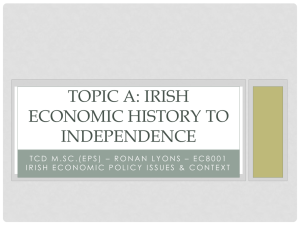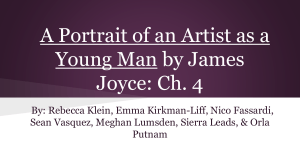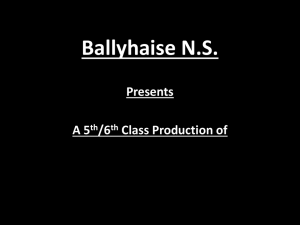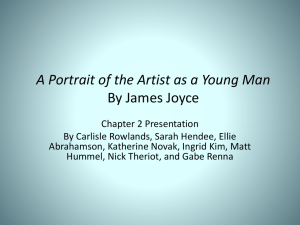Chapter 1- PAYM per.6
advertisement
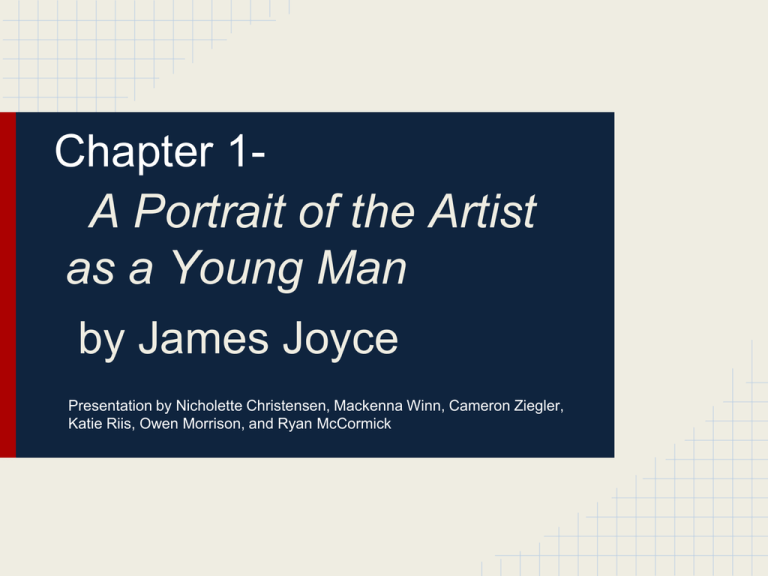
Chapter 1A Portrait of the Artist as a Young Man by James Joyce Presentation by Nicholette Christensen, Mackenna Winn, Cameron Ziegler, Katie Riis, Owen Morrison, and Ryan McCormick Chapter One The story starts with a young boy named Stephen Dedalus who is being told a children's story by his father. The narrator, which is third person omniscient, gives information to the reader about Stephen’s family briefly then jumps forward several years. It starts with Stephen being in grade school and attending a very religious, all boys boarding school. At the school, he is bullied and seems to have few friends. He is trying to discover his place but doesn't succeed and tends to isolate himself from others. He also questions the different names of God and realizes that there is only one God but he goes by different names according to different people. One day he is pushed into a muddy ditch which causes him to become sick and visit the infirmary. It then skips to him at home for Christmas dinner with his family. Here an intense argument breaks out about the political and religious issues in Ireland. When he goes back to school he breaks his glasses, which makes him incapable of doing anything until his new pair comes. He is then beaten unfairly by a teacher because of his broken glasses. Stephen decides to tell the schoolmaster and is seen as a hero to the other boys. Focus Areas Sensory experiences -hearing: “Once upon a time and a very good time it was there was a moocow coming down along the road…” (19). -sight: “his father looked at him through a glass:he had a hairy face” (19). -taste: “...where betty byrne lived: she sold lemon platt” (19). -touch: “When you wet the bed it is warm then it gets cold” (19). -smell: “His mother put on the oilsheet. That had the queer smell” (19). Motifs -hot/cold: “He shivered to think how cold they were first. But, then they got hot and then he could sleep” (29). -Childhood/Adulthood: “It was his first Christmas dinner and he thought of his little brothers and sisters who were waiting in the nursery, as he often waited…” (41). “Simon! Simon! said uncle Charles. The boy” (43). -silence/noise: “Then he heard the noise of the refectory… it made a roar like a train at night” (25). “It was not the chapel but still you had to speak under your breath” (51). Focus Areas Cont. Tensions between Catholics and Protestants -Stephen was involved in a little yet significant religious feud from the very beginning of his life when he declares that “…he was going to marry Eileen,” (20). Because Eileen was a Protestant, Stephen was scared from Dante and his mothers’ reactions to his statement which caused him to “…hid[e] under the table” (20). Later Stephen was forced to apologize for the hypocrisy of his comments. - At Christmas dinner, Dante and Mr. Casey argue over the line between religion and politics. Dante accuses the Irish leader of being Protestant for being under the control of the English government. This further establishes the idea that the Irish Catholics and English Protestants will continue to fight for many generations because of their passion for their beliefs and that these beliefs will continue to be passed down to their children. As dante said loudly, “I will defend my church and my religion when it is insulted…” (45). Betrayal of Catholicism Perceived Hypocrisy and Betrayal of Catholicism The dinner time conversation, mainly between Dante and Mr. Casey reveal the betrayal of Catholicism. During this time, Ireland was seeking home rule, and they united under leader Charles Parnell. After Parnell’s affair went public, the Catholic church stopped supporting him, yet they still advocated for home rule. This wasn't the first time they stopped supporting a leader that was working to the benefit of all of Ireland, as Mr Casey pointed out, as they stopped supporting anyone that they felt they should not be associated with. As the Catholic Church stopped supporting these leaders, the Irish people who strictly followed them, like Dante, also stopped supporting these leaders. This prohibited the progress towards home rule in Ireland. The Church stopped supporting these people for making mistakes in life. But Catholicism is based on forgiveness, so they should be given the chance to explain themselves or apologize for their sins, as the religion says. Since they were not given that chance, the hypocrisy of Catholicism was revealed. Isolation Isolation/Differentness/Weakness Various aspects of Stephen’s life makes him feel different and isloated from the other boys in the school. From the very beginning the other boys bully him and pick on him, and he is unable to play football to their same ability. His father isn’t a magistrate, like the other boys’ fathers, so that makes him feel different. He also later isolates himself, which makes the readers believe that he views himself as different, which therefore makes him feel unworthy of being in the other boys’ presence. “He sat in the corner of the playroom…” (25). All of the isolation that exists between Stephen and the other boys of the school give him a lot of time to himself, and it really shapes his identity and who he is as a person. Identity Evaluation/Establishment of Identity Being isolated from the other boys makes Stephen feel both alone and insignificant. He was brought up by a strict Catholic aunt, who taught him the fears of Christianity. The fear of going to hell dominates his life and makes him do things he doesn't necessarily know the meaning behind. Bored in study hall, he opens up his geography, but can't focus and begins contemplating his own significance. He wrote in his book, “Stephen Dedalus/ Class of Elements/Clongowes Wood College/Sallins/County Kildare/Ireland/Europe/The World/The Universe” (27). He is questioning his significance in the grand scheme of things, and partnered with his isolation and differences from the other boys, he feels weak and powerless. A later loss of innocence and apparent transition from childhood to adulthood open his eyes to the cruelties of the world and cause him to question life even more. Symbols: Color Symbolism: The colors maroon and green represent conflict and the Irish Nationalists, Parnell and Davitt. This is referred to when Dante and Stephen’s father argue about politics. It is also referred to when Dante rips off the velvet of her brushes. The colors red and white also represent conflict and opposing forces. This is revealed through the math project with roses. Orange is the color for Protestantism. Yellow is the color of decay and sickness, of something wrong or old and dying. Water Symbolism: Water is a symbol for the state of Stephen’s soul at any given time. For example, in the Clongowes instance, Stephen can’t get the feeling of the cold, slimy, filthy water out of his mind; it’s also the moment where he’s getting sick and feels scared Labyrinth/Maze Symbolism: Just like Daedalus, who was trapped in a maze and had to construct wings to fly above and escape, Stephen was trapped in a labyrinth and wanted to escape. For Stephen his school represented a maze of corridors. Symbols Cont. Birds and Flight Symbolism: Birds are a sign of the mysterious distant future Stephen sees for himself. Bird flight represents the freedom Stephen longs for. The association of flight with Stephen’s experience stems from his affiliation with Daedalus. Stephen envisions his soul flying on metaphorical wings of his own construction; like Daedalus, he must fly to escape what he perceives to be his prison “The Argument” Catholic vs. Irish Nationalists: At the Christmas Dinner Table with Dante, Mr. Casey, Stephen Dedalus, and Simon Dedalus a huge argument breaks out about Charles Parnell. Parnell committed adultery and for this reason, the Catholic Church condemned him, destroyed his career, and caused his death from exhaustion. Dante is in full support of the Church’s actions because she is a devout Catholic. On the other hand, Casey and Simon admired Parnell because he was a Irish Nationalist hero. They also mention that the church has betrayed Ireland before. Dante becomes furious. The argument is very vicious and ends with emotional hurt and tears. Loss of Innocence: At the Christmas dinner, Stephen is able to sit at the adult table for the first time. He also witnesses the brutal fight between the adults about Parnell’s affair. When it is brought up that two boys are in trouble for some unknown offense. It is suggested that the boys either stole the Communion wine, or either participated in a homosexual act. These are all events in which Stephen learns about the crude world. “The Argument” Cont. Portrayal of Adults: In Chapter One, adults are portrayed as strict authority figures. They make many decisions for Stephen and direct his path towards life. It is almost as though the adults try to instill their own ideals into Stephen’s head. Adults are also the ones that inflict punishment and protection. Stephen’s Epiphany In the beginning of the chapter, Stephen’s father tells him a nursery rhyme about baby tuckoo to help him fall asleep. Children often see themselves as the center of the universe and have no perception of other forces. When Stephen writes the poem in the geography book, it is obvious that his point of view has changed. The poem reads: “Stephen Dadelus, Class of Elements, Clongwoes Wood College, Sallins, County Kildare, Ireland, Europe, The World, The Universe.” The poem reads from the object with the least significance and gradually increases in significance ending with the Universe. Stephen has now matured from his young childhood and ponders his insignificance. Moment of Stasis Moment of Stasis: Stephen’s moment of stasis occurs when the boys lift up Stephen as if he is a hero for telling on Father Dolan for beating him. “They made a cradle of their locked hands and hoisted him up among them and carried him along till he struggled to get free...He was happy and free: but he would not be anyway proud with Father Dolan” (p.68). He realizes that he may be destined as a hero, or to make a change in his life. He is not quite ready for the change, but he can sense its importance. Historical Links in the Text ● Charles Stewart Parnell ● The Fenian Movement ● Terence Bellew MacManus ● Hamilton Rowan ● Lord Leitrim’s coachman ● Michael Davitt History, cont’d Parnell ● Irish Nationalist fighting for home rule in the 1880s. ● He became elected President of the National Land League in 1879 ● Initially supported William Gladstone, until Gladstone’s Land Act of 1881 was not what Parnell expected ● He used boycotts as a way of influencing landlords, but he was sent to jail for that. ● He eventually got Gladstone to Prime Minister, but the Irish Home Rule Bill never passed the House of Commons ● He was revered by English Liberals after a note that excused the murder of two British Ministers in Dublin. ● However, almost right after, William O’Shea filed for divorce because his wife had an affair with Parnell. This led to Parnell being removed from party leadership http://www.bbc.co.uk/history/historic_figures/parnell_charles.shtml, Mrs. Lax More History! The Fenian Movement ● An Irish revolutionary movement that believed that London had intentionally not aided the Irish during the Great Famine ● In 1848, a group called Young Ireland launched an uprising against the British government. It was crushed Terence Bellew MacManus ● A member of Young Ireland, he was sent to Tasmania for life, from where he escaped to San Francisco. ● In San Francisco, he died in poverty in 1861 ● At his funeral in Ireland, thousands of people attended, signalling the Irish sentiment about home rule http://www.historylearningsite.co.uk/fenian_movement.htm http://www.nationmaster.com/encyplopedia/Terrence-MacManus Even More History!! Hamilton Rowan ● Known in Ireland as a defender of the poor for standing up for a peasant Mary Neal against a Lord, despite Rowan’s wealth. ● Was a founding Member of the Society of United Irishmen, along with Wolf Tone. ● He was imprisoned for libel, and while in prison met William JAckson who was working for the French, seeing if they could help the Irish, since they still hated the British. ● He fled to Philadelphia after he escaped to France by climbing down a rope of sheets out of his bedroom window. ● He received a Hero’s welcome upon his return home to Ireland in 1806. ● He gave speeches until he was on his deathbed. http://www.libraryireland.com/biography/ArchibaldHamiltonRowan.php Yay! History! Lord Leitrim’s coachman ● Lord Leitrim was an unpopular Irish figure ● He, along with his coachmen, were ambushed and murdered while travelling from town to town. ● His funeral caused much unrest throughout Dublin, as many people despised him, yet said nothing while he was alive. http://www.loughrynn.net/id41.htm Michael Davitt ● He was born during the Great Famine, and his family was forced to move to England, where he worked in a cotton mill. ● But he had to have his arm amputated due to an accident. ● He then discovered the Fenian Movement, which he joined and soon climbed through the ranks, before he was arrested for arms smuggling. ● When he died, over 20,000 people viewed his coffin. http://www.museumofmayo.com/davitt1.htm Greek Mythology ● Daedalus- “The Great Artificer”: was an inventor, he designed the labyrinth, where he was later imprisoned to. The most obvious connection Joyce makes to Daedalus is the name of the main character, Stephen Dedalus. As others begin to address him by his last name, his attitude begins to change and he longs escaping the life that he realizes he will be forced to live in. ● King Minos: Gave Daedalus refuge in Crete but put him to work, had the labyrinth made. Maybe an authority figure in Stephen’s life could be thought of as a “King Minos”, or one who has confined him to a certain life that he doesn't want to live. Maybe Clongowes College. ● Minos’ wife and the bull: Minos’ wife lusted for the bull and gave birth to the minotaur, thus making king minos hate him. Once the minotaur was birthed, Daedalus created the labyrinth for him to live in. ● The Minotaur: He was half man, half bull; very wild and violent. He was sentenced to wander the labyrinth forever. Stephen Dedalus, in the book, seems as though he is trapped in a labyrinth of his own, his life is full of paths laid down by others. He never has a chance to really make the most of his situations. Greek Mythology Cont. ● The Labyrinth: made by Daedalus for Minotaur , was eventually imprisoned in it with son Icarus ■ Connection to Book: imprisoned in school, doesn't want to be there, isolates himself,Example: counting down the days until holidays ● The wings: Made wings out of wax and feathers to escape labyrinth ■ Connection to Book: Joyce refers to flight a lot, for example: “..the greasy orb flew like a heavy bird through the grey light.” pg. 4, Stephen wants to escape from the school ● Icarus’ fall- Daedalus told his son not to fly too high because wax will melt didn't listen and fell to his death, this was Daedalus’s sacrifice to escape the labyrinth ■ Connection to Book: Stephen can symbolize Daedalus and it foreshadows that he will possible need to make a sacrifice to leave the school QUIZ TIME 1. Who invented the wings? 2. What does the labyrinth symbolize in the novel? 3. What do the colors maroon and green symbolize? 4. What is Stephen’s epiphany? 5. What aspects of his school and personal life make Stephen feel isolated from the other boys? 6. Why are there so many arguments regarding Catholicism in this chapter? 7. What color are the roses that Stephen thinks are beautiful? 8. What does Stephen do that causes kids to see him as a hero? 9. What is the significance of Stephen’s family being divided when it comes to Irish home rule? 10. Why is the reference to Lord Leitrim’s coachman so powerful in Mr. Casey’s argument? Quiz Answers 1. Daedalus 2. Stephen being trapped in his own life, as others seem to control it. 3. Maroon and green symbolize the conflict between the Irish Nationalists and the Protestants. 4. Stephen is insignificant in and there are other forces larger than himself. 5. His father is not a magistrate, he is bullied at school, the other kids pick on him, he would rather be left alone 6.Catholicism and the degrees to which it should be followed were debated in this time, as the Church did some controversial things and stopped supporting people key to the betterment of Ireland, just for making some mistakes 7. The roses are red and white. 8.The other kids view him as a hero when Stephen goes to the rector(schoolmaster) and tells him about the unfair beating he received. 9. The split in the family is representative of much of Ireland felt at the time, with there being a split between Catholics and Protestants, as well as in the approval of home rule 10. It is because it refers to being oppressed, but still following blindly, which Mr. Casey says that the Catholics are doing buy not supporting home rule. Bibliography Greek Mythology: Mrs. Lax AP English 12 Allusions Sheet http://www.shmoop.com/portrait-of-the-artist-as-a-young-man/color-symbol.html http://www.online-literature.com/forums/showthread.php?24885-Colors-used-in-quotA-Potrait-of-an-Artist-as-a-young-man-quot http://www.shmoop.com/portrait-of-the-artist-as-a-young-man/water-symbol.htm http://www.novelguide.com/a-portrait-of-the-artist-as-a-young-man/metaphor-analysis http://www.gradesaver.com/portrait-of-the-artist-as-a-young-man/study-guide/section1/
